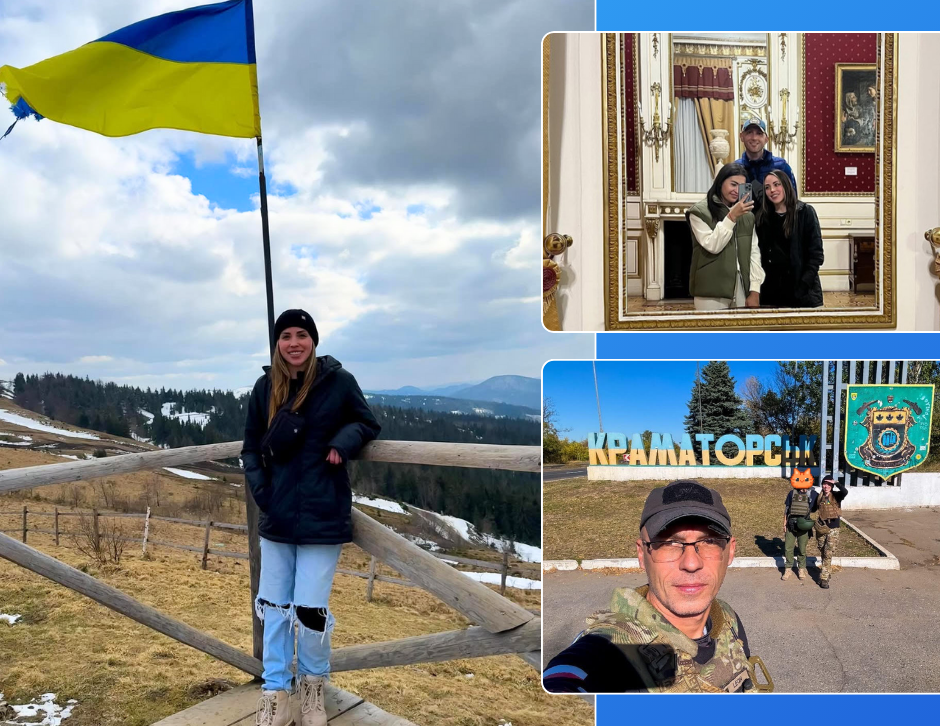Luminous Conversations Are Possible in Spite of the War
- Susan M. Carini
- Sep 9, 2025
- 4 min read
Updated: Sep 12, 2025

Every Wednesday morning, I get my jolt of optimism from a perhaps unexpected source.
It comes from a Ukrainian woman based outside Kyiv. At 9:00 a.m. EST for me and 4:00 p.m. EEST for her, we speak for an hour. Ostensibly, we are working.
Several months ago, we each signed on with ENGin to do that very thing: talk. The nonprofit, which pairs Ukrainians learning English with volunteers, is committed to “advancing social and economic development in Ukraine by building a critical mass of globally connected, English-fluent citizens.”
Oksana joined wanting to polish her English; I came on as a retiree from a communications post in U.S. higher education, still in love with language and happy to share what I know.
We were nervous wrecks at the start. I wondered, “Would her English be good enough for us to converse?” Apparently, the same thought bubble parked over her head.
On WhatsApp before our first talk, she apologized for any hiccups we might experience, and I hastened to reassure her that we always had Google Translate if the going got tough. But guess what?
It was a breeze. She is an impressive speaker who has put in the work before meeting me, believing that English can be helpful in her professional life as an accountant at a firm with English-speaking clients.
Our sessions, then, don’t turn on lessons that I provide. Instead, we have the luxury of diving deep with topics that interest us — how we view AI, where we would time-travel, how we define success, advice we would give our younger selves.In so doing, we quickly climbed the rungs from anxious strangers to friends.
Amid the innumerable conversations we all have per week, think hard about their quality. Many are rushed and fragmented, sometimes conducted as we stare more longingly at computer or phone screens than at each other.
Here’s what I have discovered: how clarifying it is to make room for true conversation, to do nothing but that for an hour. To take on big topics and small, to start to see yourself through the eyes of someone who, just months ago, was completely unknown.
As I trained for this program, volunteers were advised about how to navigate Ukrainians’ lived reality of war. What should we say and not say?
Before our first conversation, I considered what it would be like for me to encounter Oksana’s reality every day. I have no equivalent, so I thought about the 9/11 attack, about my haste to leave work at Emory University that day. Emory is a neighbor of the Centers for Disease Control and Prevention, which was rumored to be a potential target and indeed, this past week, did become so.
I went home, glued to the news accounts, and called people I love to remind them of that love. I also remember walking my dog that afternoon and looking up in the sky, wondering if more commandeered planes would drop on us. I felt genuine fear.
Nonetheless, it soon became clear that we, as a country, were no longer under siege. It was an act of unspeakable terror confined to one day.
For Oksana, the war is omnipresent and frightening but manageable. She doesn’t dwell on it, so these are the relatively few details I know.
Her husband was drafted, required to leave his job at age 47 and support the war effort. Injured, he now serves in a noncombat role. Oksana accompanied him when he was first called up, and while both were away, their apartment was bombed. Though the units are now habitable, the building’s exterior still bears the scars.
Questions constantly bubble up that I could pose. The big ones: Does she know anyone who has been killed? Has the experience changed her in some fundamental way? The smaller ones: when did she last take shelter?
I generally don’t ask, and here’s why. Each Wednesday morning, she greets me with a smile and the question, “What is new with you?” It seems impossible that I am talking to someone in a war zone, a woman whose husband and apartment are vivid reminders of the dangers all around her.
Always, Oksana has prepared for our session, war be damned. She is funny, whip-smart, and insightful, an equal part of whatever conversational ore we happen to mine that week.
I realize that she is not the only one daring the war to blunt her joy or block her progress through life. Hundreds of thousands of Ukrainians are doing that very thing, but she is the one I know. The one I worry about. The one I admire.
When I ask the question in return every Wednesday morning — “What is new with you?” — I get answers like “We saw a play last weekend” or “My husband and I renewed our wedding vows.” Absolutely ordinary actions that, in the circumstances, require extraordinary courage.
And with that prelude, we are off. It’s just another Wednesday, checking in on my newest friend, half a world away, in a war zone.


